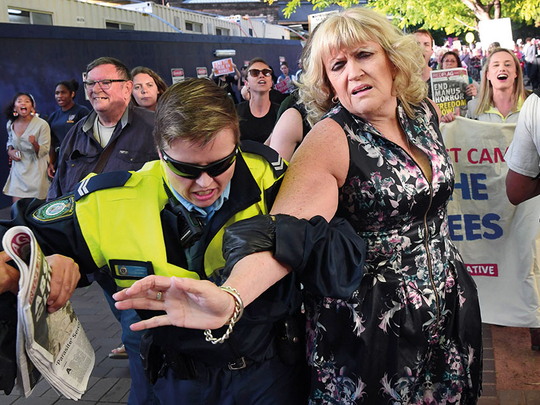
Sydney: Papua New Guinea authorities destroyed makeshift shelters and removed water stores in a shuttered Australia refugee camp on Friday, just hours ahead of a deadline for the inmates to leave or be forced out, detainees said.
The Manus Island camp held asylum seekers who tried to reach Australia by boat under Canberra’s tough immigration policy, but was ruled unconstitutional by PNG’s Supreme Court and closed on October 31.
Some 600 men barricaded themselves in the camp despite water and electricity being cut off, citing fears of a hostile reception from locals near three new transition centres set up for them.
“Everyone in the tropics knows how precious water is and how quickly dehydration can become a serious medical issue,” Refugee Action Coalition’s Ian Rintoul said in a statement Friday of the authorities’ actions.
Behrouz Boochani, an Iranian refugee on Manus, tweeted Friday that shelters were torn down and rubbish bins used to collect rainwater had been destroyed.
“Police and immigration destroyed our shelters. Inside the rooms is very hot without power for fans. We built these shelters to provide shade & cover from tropical sun & rain,” he wrote.
He said workers on Thursday had also removed security fences around the centre.
Footage released Friday by Australian advocacy group GetUp showed the men enduring deteriorating conditions, with detainees sleeping on tables outside shipping containers to escape the heat, as well as blocked toilets and makeshift wells dug to store water.
“Death or serious illness is inevitable in coming days,” GetUp human rights co-director Shen Narayanasamy, who visited the camp, said in a statement.
“These men are sick, thirsty and hungry. The conditions are appalling and it’s obvious you wouldn’t choose to stay here if you thought you could be safer elsewhere.”
An injunction sought by Boochani to restore water, power and food supplies to the camp was rejected by PNG’s Supreme Court Tuesday, with his appeal to be heard Monday.
PNG police said Friday that “almost 60 refugees have voluntarily boarded buses and open back trucks with their cargoes to their new locations”.
Police spokesman Superintendent Dominic Kakas added that he expected “all refugees will leave the centre” Friday, saying the transfers “will be conducted smoothly and orderly without use of force”.
But Boochani said only a few people had left the centre with hundreds of others “still refusing” to go.
A notice at the camp Thursday warned that “force may be used to relocate those who refuse to move voluntarily” by Saturday.
PNG Prime Minister Peter O’Neill added that “appropriate means” would be used to “apprehend individuals who are causing unnecessary anxiety and violence”.
Canberra has been under pressure from refugee advocates and the United Nations to close the camp on Manus, and another on Nauru, amid concerns about their conditions and the impact of prolonged detention on mental and physical health.
The UN Human Rights Committee in Geneva Thursday slammed the closure of Manus “without adequate arrangements for long-term viable relocation solutions for all refugees and asylum seekers transferred there”.
The refugees are barred from resettling in Australia but Canberra has struggled to transfer them to third countries.
A deal struck with the United States to take up to 1,250 refugees has so far only seen 54 accepted, with 24 flown to America in September.
Australian Prime Minister Malcolm Turnbull Friday called on the refugees to “comply with the lawful requests and requirements of the PNG authorities”, and stressed they would not be taken to his country.












